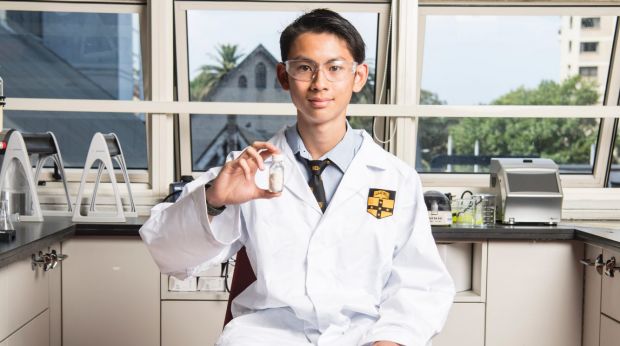Martin Shkreli was the ''big pharma bro" who outraged the world by hiking the price of an essential drug from $US13.50 ($18) to $US750 a tablet.
Now a handful of year 11 students in Sydney have shown him up, cooking the same drug in their school lab for about $2 a dose.
More NSW News Videos
Students make anti-malarial drug for cheap
A handful of year 11 students in Sydney synthesise an expensive anti-malarial drug for about $2 a dose.
Daraprim is an anti-parasitic medicine used to treat infections such as toxoplasmosis and malaria. It is on the World Health Organisation's list of essential medicines.
The drug is used to treat people with low immune systems, such as people living with HIV, chemotherapy patients and pregnant women.

In September last year hedge-fund manager Shkreli gained control of Turing Pharmaceuticals and attracted worldwide opprobrium by increasing the price of the drug more than 5000 per cent.
He went on to spend $US2 million on the only available copy of a Wu-Tang Clan album.
He was called "a morally bankrupt sociopath", a "scumbag" and "everything that is wrong with capitalism".
Hillary Clinton accused him of price gouging and The Atlantic described him as "the face of unapologetic profiteering from the suffering of humans".

Price gouging like this in the specialty drug market is outrageous. Tomorrow I'll lay out a plan to take it on. -H https://t.co/9Z0Aw7aI6h
— Hillary Clinton (@HillaryClinton) September 21, 2015
University of Sydney chemist Dr Alice Williamson thought it an ideal drug to synthesise in a school lab for chemistry students at Sydney Grammar School.

"The background to this made it seem more important," said James Wood, 17, one of the boys involved in the project.
"Working on a real-world problem definitely made us more enthusiastic," said another of the Sydney Grammar boys, Austin Zhang, 17.
This is the second year that the University of Sydney's Open Source Malaria Consortium has done outreach work with Sydney Grammar. The consortium's guiding principle is to use publicly available drugs and medical approaches to cure malaria.
The work of Dr Williamson and consortium founder Associate Professor Matthew Todd has been praised by Bill Gates, whose foundation is looking for a cure to malaria.
Meet the scientist who’s fighting malaria by sharing open data: http://t.co/vj1Gyp4oRH
— Bill Gates (@BillGates) October 30, 2013
"This has been a great pilot program. The next challenge is to work with kids from all sorts of schools," Dr Williamson said.
She said this can happen one of two ways: "We can take students to labs or labs to students.
"Not all schools have the lab facilities that Sydney Grammar has," she said.
The consortium is looking to raise money to fit-out an RV [recreational vehicle] as a lab to take out to schools.
Given the public scandal from September last year, the boys definitely "shared the outrage of the general public", Dr Williamson said. And this gave more of a focus to the work.
The students started with 17 grams of the raw material 2,4-chlorophenyl acetonitrile, also called (4-chlorophenyl)acetonitrile. You can buy it online at $36.50 for 100 grams.

The raw material 2,4-chlorophenyl acetonitrile (left) can be synthesised into pyrimethamine (Daraprim). The sample on the right was made by Sydney Grammar students and is the equivalent of $150,000 worth at US prices. Photo: University of Sydney
To make the Daraprim, the boys worked through a number of steps with their chemistry teacher, Dr Malcolm Binns.
"We couldn't use the patented route as it involved dangerous reagents," he said.
Dr Williamson, Dr Binns and the boys had to find an innovative pathway from the starting compound to the end result.
They synthesised the end-product last week. Dr Williamson tested its purity in a spectrograph at university.
"It's one of the most beautiful spectrographs I've ever seen, actually," she said.
From the 17 grams starting material, the boys produced 3.7 grams of pyrimethamine, the chemical name of Daraprim.
"That's about $US110,000 worth of the drug," Dr Williams said, based on the price mark-up of Turing Pharmaceuticals.
But could they sell it on the open market in the US?
"While the drug is out of patent, Turing Pharmaceuticals controls its distribution and sale through a loophole called the 'closed distribution model'," said Associate Professor Todd.
"To take the drug to market as a generic, you need to compare it to Turing's product. If Turing won't allow the comparisons to take place, you'd need to fund a whole new trial," he said.
The drug, however, is available in Australia for a reasonable price. Fifty tablets of a 25 milligram dose will cost $12.99.
On Wednesday the boys presented their results at the Royal Australian Chemical Institute NSW Organic Chemistry symposium. They did so alongside honours and postgraduate students, and postdoctorals.













